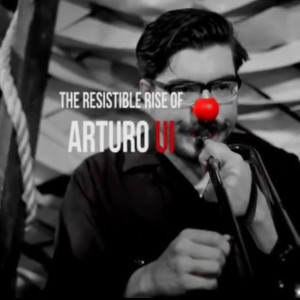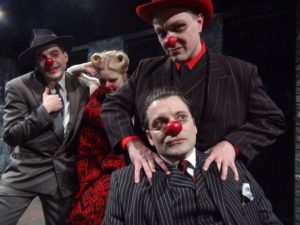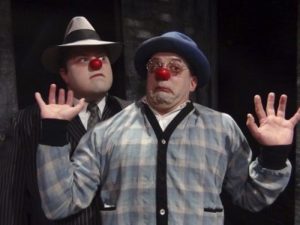
 [rating=5]The Resistible Rise of Arturo Ui (pronounced ooey) may be the last historical play you ever want to see become relevant again, but at least under the direction of Victor Quezada-Perez, Trap Door Theatre gives it an outstanding production. Mostly written in 1941, Bertolt Brecht’s parable about the rise of Adolf Hitler is set in Chicago and presents the dictator as a gangster rising to the top of local politics through a combination of brutality, fear-mongering, obfuscation, and mostly other people’s corruption and unwillingness to see what is directly in front of them. Though Brecht meant for the play to educate Americans about the circumstances which can produce a tyrant, the play is no dry history lesson. Quezada-Perez’s background in clowning has provided him with the means to devise a movement vocabulary for his actors which dovetails perfectly with George Tabori and Alistair Beaton’s stylized translation.
[rating=5]The Resistible Rise of Arturo Ui (pronounced ooey) may be the last historical play you ever want to see become relevant again, but at least under the direction of Victor Quezada-Perez, Trap Door Theatre gives it an outstanding production. Mostly written in 1941, Bertolt Brecht’s parable about the rise of Adolf Hitler is set in Chicago and presents the dictator as a gangster rising to the top of local politics through a combination of brutality, fear-mongering, obfuscation, and mostly other people’s corruption and unwillingness to see what is directly in front of them. Though Brecht meant for the play to educate Americans about the circumstances which can produce a tyrant, the play is no dry history lesson. Quezada-Perez’s background in clowning has provided him with the means to devise a movement vocabulary for his actors which dovetails perfectly with George Tabori and Alistair Beaton’s stylized translation.
As is the norm for Trap Door shows, several cast members are already onstage when the house opens. They all wear bright red noses which inhibit their breathing, resulting in their taking exaggeratedly large sniffs throughout the show. Those full-bodied inhalations become the basis for a kind of language in their own right, as demonstrated by the numerous conversations going on entirely through frantic gestures and facial expressions, tilted heads, and blasted air. It’s a good introduction to a world where the characters all speak in passionate rhetoric and occasionally lapse into rhyming couplets. It’s also a delivery which evokes old newsreels of Hitler’s speeches with weird frame rates.
Simultaneously transfixing and repulsive in the role of Arturo Ui is Antonio Brunetti. With his nose covered up and a haircut by Trap Door designer Zsófia Östvös, Brunetti bears an unholy resemblance to Hitler, which he plays up through a rambling, slang-ridden accent accompanied by arm waving and hairflips. One of Brecht/Tabori’s conceits is that, although Ui’s Brooklynite babbling is often self-contradictory or gives away his malicious intentions outright, his confusing syntax and the sheer amount of his verbiage make him difficult to argue with. He just sounds like he knows what he’s talking about. And then there’s the gang of flunkies cracking their knuckles at anyone who challenges him too much. Casey Chapman, Bill Gordon, and Kevin Webb play gangland versions of Ernst Röhm, Hermann Göring, and Joseph Goebbels with sinister comedic pizazz, as does Abby Blankenship as Ui’s moll.
Brecht claimed he meant for The Resistible Rise to be a fable and not a definitive account of Germany’s slide into fascism. The play amusingly uses a scheme concocted by a “cauliflower trust” (led by Lyndsay Rose Kane as the conniving Clark) to bribe an alderman, Dogsborough (Bob Wilson) as a metaphor for how President Hindenburg and corrupt business leaders in the late Weimar Republic thought they could use the Nazis for their own ends and wound up getting blackmailed or strong-armed. The comparatively lower stakes here, including Ui’s ambition to annex Cicero, make the play both more amusing and horrifyingly more plausible. I do find it odd that the production makes no mention of the Nazis’ anti-Semitism; Ui rants against vaguely defined criminals and outsiders without scapegoating anybody in particular, which isn’t how authoritarians generally operate. But if the play were an exact depiction of the Nazis, people would be able to rationalize why their own situation is totally different from Weimar Germany’s and it couldn’t happen here.
As the Master of Ceremonies, David Steiger helpfully provides the historical parallel for each beat in the plot. In addition to that, Quezada-Perez’s staging and the work by the ensemble (which also includes Dennis Bisto, Derek Jeck, Mike Steele, and Nora Lise Ulrey) and their musical selections are so inventive that anyone not already familiar with this era will learn a great deal while experiencing hair-raising stagecraft. Like Man Equals Man and The Good Person of Szechwan, The Resistible Rise of Arturo Ui presents a bleak world with the hope of changing ours. But unlike those works, this one ends with an unforgettable direct call to action.
Trap Door Theatre’s production of The Resistible Rise of Arturo Ui runs through April 22, with performances as follows:
Fridays: 8:00 p.m.
Saturdays: 8:00 p.m.
Tickets are $20 on Thursdays and Fridays, $25 on Saturdays, and are 2 for 1 on Fridays. To order, call 773-384-0494 or visit TrapDoorTheatre.com. The show runs one hour and fifty minutes.
Trap Door is located at 1655 W. Cortland Ave, Chicago, behind Jane’s Restaurant. The entryway is in an alley and designated by a sign on the sidewalk. Free and metered parking is available in the area.
To see what others are saying, visit www.theatreinchicago.com, go to Review Round-Up and click at “The Resistible Rise of Arturo Ui.”







More Stories
“The S Paradox” reviewed by Julia W. Rath
“A Year With Frog and Toad”
” Monsieur Chopin” a play with music